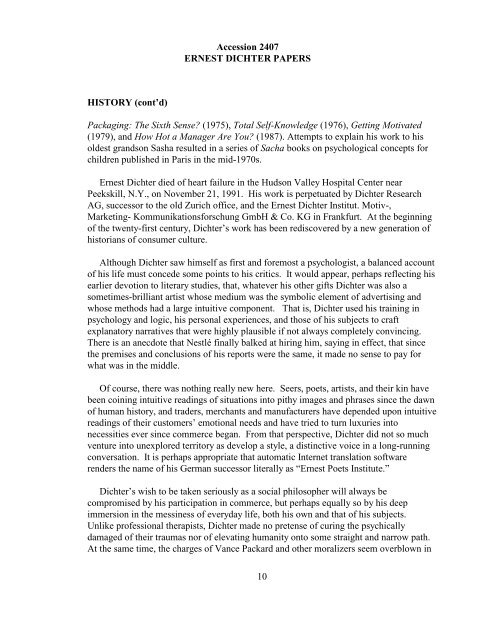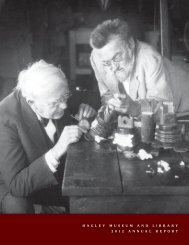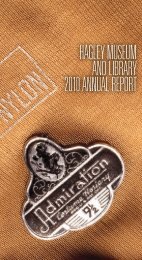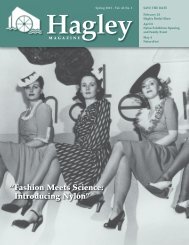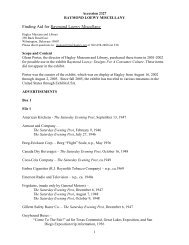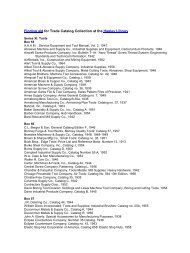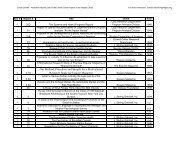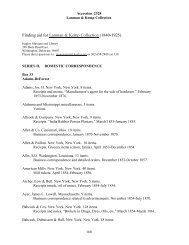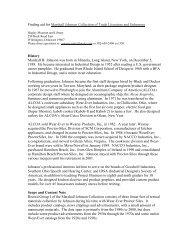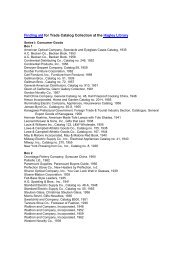Ernest Dichter Papers - Hagley Museum and Library
Ernest Dichter Papers - Hagley Museum and Library
Ernest Dichter Papers - Hagley Museum and Library
Create successful ePaper yourself
Turn your PDF publications into a flip-book with our unique Google optimized e-Paper software.
HISTORY (cont’d)<br />
Accession 2407<br />
ERNEST DICHTER PAPERS<br />
Packaging: The Sixth Sense? (1975), Total Self-Knowledge (1976), Getting Motivated<br />
(1979), <strong>and</strong> How Hot a Manager Are You? (1987). Attempts to explain his work to his<br />
oldest gr<strong>and</strong>son Sasha resulted in a series of Sacha books on psychological concepts for<br />
children published in Paris in the mid-1970s.<br />
<strong>Ernest</strong> <strong>Dichter</strong> died of heart failure in the Hudson Valley Hospital Center near<br />
Peekskill, N.Y., on November 21, 1991. His work is perpetuated by <strong>Dichter</strong> Research<br />
AG, successor to the old Zurich office, <strong>and</strong> the <strong>Ernest</strong> <strong>Dichter</strong> Institut. Motiv-,<br />
Marketing- Kommunikationsforschung GmbH & Co. KG in Frankfurt. At the beginning<br />
of the twenty-first century, <strong>Dichter</strong>’s work has been rediscovered by a new generation of<br />
historians of consumer culture.<br />
Although <strong>Dichter</strong> saw himself as first <strong>and</strong> foremost a psychologist, a balanced account<br />
of his life must concede some points to his critics. It would appear, perhaps reflecting his<br />
earlier devotion to literary studies, that, whatever his other gifts <strong>Dichter</strong> was also a<br />
sometimes-brilliant artist whose medium was the symbolic element of advertising <strong>and</strong><br />
whose methods had a large intuitive component. That is, <strong>Dichter</strong> used his training in<br />
psychology <strong>and</strong> logic, his personal experiences, <strong>and</strong> those of his subjects to craft<br />
explanatory narratives that were highly plausible if not always completely convincing.<br />
There is an anecdote that Nestlé finally balked at hiring him, saying in effect, that since<br />
the premises <strong>and</strong> conclusions of his reports were the same, it made no sense to pay for<br />
what was in the middle.<br />
Of course, there was nothing really new here. Seers, poets, artists, <strong>and</strong> their kin have<br />
been coining intuitive readings of situations into pithy images <strong>and</strong> phrases since the dawn<br />
of human history, <strong>and</strong> traders, merchants <strong>and</strong> manufacturers have depended upon intuitive<br />
readings of their customers’ emotional needs <strong>and</strong> have tried to turn luxuries into<br />
necessities ever since commerce began. From that perspective, <strong>Dichter</strong> did not so much<br />
venture into unexplored territory as develop a style, a distinctive voice in a long-running<br />
conversation. It is perhaps appropriate that automatic Internet translation software<br />
renders the name of his German successor literally as “<strong>Ernest</strong> Poets Institute.”<br />
<strong>Dichter</strong>’s wish to be taken seriously as a social philosopher will always be<br />
compromised by his participation in commerce, but perhaps equally so by his deep<br />
immersion in the messiness of everyday life, both his own <strong>and</strong> that of his subjects.<br />
Unlike professional therapists, <strong>Dichter</strong> made no pretense of curing the psychically<br />
damaged of their traumas nor of elevating humanity onto some straight <strong>and</strong> narrow path.<br />
At the same time, the charges of Vance Packard <strong>and</strong> other moralizers seem overblown in<br />
10


